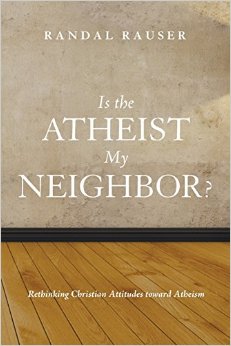Podcast: Play in new window | Download
Subscribe: Spotify | Email | RSS
 In this final part of our discussion (part 1) Dr. Rauser and I continue to discuss his interesting new book: Is the Atheist My Neighbor? Rethinking Christian Attitudes toward Atheism. We discuss the following questions:
In this final part of our discussion (part 1) Dr. Rauser and I continue to discuss his interesting new book: Is the Atheist My Neighbor? Rethinking Christian Attitudes toward Atheism. We discuss the following questions:
- Does experience give us enough evidence to believe the Rebellion Thesis? (That atheism is always caused by active suppression of a disposition to believe, motivated by hatred of God and the desire to sin without being held accountable by God.)
- How does the worldview of naturalism relate to atheism?
- If some but not all atheists are blameworthy for their atheism, what’s the difference between the two groups?
- Can a person who has suffered profoundly be reasonable in believing atheism?
- How do assumptions about divine providence affect one’s interpretation of seemingly unjustified suffering?
- How has Dr. Rauser’s friendships with atheists affected his views on atheism?
- Is there some positive relationship between atheism and the love of sin?
- How can one’s sinful desires shape one’s positive theology?
- Does insecurity cause some Christians to adopt an over-aggressive stance towards atheists?
- Do public debates between Christians and atheists do more harm than good?
You can also listen to this episode on Stitcher or iTunes (please subscribe, rate, and review us in either or both – directions here). It is also available on YouTube (scroll down – you can subscribe here). If you would like to upload audio feedback for possible inclusion in a future episode of this podcast, put the audio file here.
You can support the trinities podcast by ordering anything through Amazon.com after clicking through one of our links. We get a small % of your purchase, even though your price is not increased. (If you see “trinities” in you url while at Amazon, then we’ll get it.)
- Dr. Rauser’s blog: The Tentative Apologist
- Can Christians and Atheists Stop Fighting? The Rauser/Shaha Conversation – a recent episode of the Unbelievable radio show and podcast, in which Dr. Rauser dialogues with an ex-Muslim atheist from the U.K.
- Tentative Apologist podcast #54 William Lane Craig on Apologetics and Debates
- Tentative Apologist podcast #32 Fred Sanders on the Trinity
- Tentative Apologist podcast #11 Loftus and Rauser talk natural theology and the Trinity
- Dr. Rauser’s books
- Goetz and Taliaferro, Naturalism (kindle)
- Aggrieved father Bob Jyono in the documentary Deliver us from Evil (trailer)
- the theology of Paul Tillich and his sexual behavior
- John Stewart’s famous 2004 appearance on CNN’s Crossfire.
- “Divine Deception and Monotheism“
- Clarke The Scripture Doctrine of the Trinity
- This week’s thinking music is “Phase IV” by lo-fi is sci-fi.


Why are there atheists?
How can atheists even exist if all the Christian apologetic arguments are as convincing as apologists claim such arguments are?
Is Randal saying that the existence of atheists is something no one in the Bible ever mentioned or imagined?
Edward
Is Randal saying that the existence of atheists is something no one in the Bible ever mentioned or imagined?
This cannot be, because …
The fool says in his heart, “There is no God.” They act corruptly, they make a deed evil; there is none that does good. (Psalm 14:1)
But see what “the fool” really thinks:
4 The wicked in his proud countenance does not seek [God]; God [is] in none of his thoughts. (…) 11 He has said in his heart, “God has forgotten; He hides His face; He will never see.” (Psalm 10:4,11)
The Fool says there is no YHWH, the fool could absolutely be a theist in some sense.
I don’t think Psalm’s is talking about intellectual atheists at all.
The Fool [sic] says there is no YHWH, the fool could absolutely be a theist in some sense.
What sense?
I don’t think Psalm’s is talking about intellectual atheists at all.
I have already considered that. See the comment on Psalm 10:4,11.
You’re right about psalm 14:1, sloppy mistake on my part, my bad.
But I still hold to the idea that we are talking about someone who in his heart believes there is no God, I.e. How he lives and acts. I think there is a difference between that and an intellectual position.
Roman
… I still hold to the idea that we are talking about someone who in his heart believes there is no God, I.e. How he lives and acts. I think there is a difference between that and an intellectual position.
The difference may not be so great, nor so difficult to bridge. In Dale’s latest post (podcast 105 – Dr. James Spiegel on The Making of an Atheist) we read:
“Dr. James Spiegel, professor of Philosophy and Religion at Taylor University, argues that unbelief results more from the will than from the mind.”
Or, IOW, intellectual atheism may be the consequence of “ethical atheism”.
I am not entirely sure that this is the case (I believe there can be bona fide intellectual atheist, or at least radical agnostics). OTOH I seriously doubt the sincerity of emphatic militant atheists like the “Four Horsemen”: Dawkins, Dennet, Harris and the late Hitchens.
It depends, for example I can point to intellectual theists who live their lives as if there was no God, and atheists who live as if there was God.
I can tell you that some hedge fund manager who loves his entire life for the persist of profit and pleasure, may have an intellectual belief in God, he may go to church, but certainly he doesn’t live like it.
You may then have someone who dedicates his entire life for justice for the poor and disadvantaged, who does not believe in God, say for example due to the problem of evil, or his upbringing in a culture preaching naturalism, but he certainly lives like he beliefs in the transcendent, and probably deep down he does.
Things are not that simple.
But take hitchens as an example, he hates God, but yet he could never divorce himself from a belief in absolute moral value (and it seems like he took that seriously) compare that to a figure like Donald trump, who claims belief in God and I believe him, but certainly doesn’t display any sign of it being in his heart.
Roman
… take hitchens as an example, he hates God, but yet he could never divorce himself from a belief in absolute moral value (and it seems like he took that seriously) compare that to a figure like Donald trump, who claims belief in God and I believe him, but certainly doesn’t display any sign of it being in his heart.
Yes, I agree. As you say, “tthings are not that simple”.
Pingback: Still Talking Atheism on The Trinities Podcast | Randal Rauser
Comments are closed.